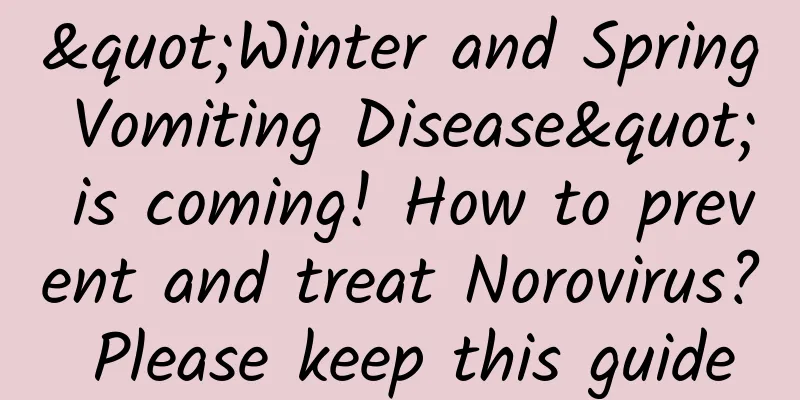"Winter and Spring Vomiting Disease" is coming! How to prevent and treat Norovirus? Please keep this guide

|
In winter and spring, norovirus quietly ravages the country, and many people are sent to the hospital due to sudden vomiting and diarrhea. The culprit is norovirus. This virus is highly contagious and can easily cause clustered outbreaks in crowded places such as schools, childcare institutions, and nursing homes, seriously affecting people's lives and health. Understanding norovirus and doing a good job of prevention are the keys to protecting our health. The cold climate and intensive indoor activities create favorable conditions for the spread of the virus, making it the main culprit of "winter and spring vomiting disease". Today, Su Xiangyan, director of the Infection Control Department of Hunan Provincial Hospital of Integrated Traditional Chinese and Western Medicine (Affiliated Hospital of Hunan Institute of Traditional Chinese Medicine), will give you some popular science knowledge about Norovirus. 1. What is Norovirus? Norovirus, also known as Norwalk virus, is an acute gastroenteritis virus that causes gastrointestinal inflammation after infection. It is like a cunning "little devil" with extremely strong resistance. It can survive in low temperature and acidic environments. Ordinary disinfectants are difficult to kill it completely, and it can even survive on the surface of objects for weeks. It is mainly transmitted through the fecal-oral route, and infection can cause symptoms such as nausea, vomiting, diarrhea, and abdominal pain. It is more common in winter, so it is also called "winter and spring vomiting disease." 2. What are the characteristics of Norovirus? Highly contagious: Very small amounts of virus (18 virus particles) can cause infection. Wide transmission routes: can be transmitted through food, water, contact with fomites or inhalation of aerosols. Strong resistance: resistant to low temperature and acid, not easily killed by common disinfectants. Even 75% alcohol has no effect on it. It can be disinfected with chlorine-containing disinfectant, ready for use. Susceptible population: Everyone is generally susceptible, and immunity after infection is short-lived, and repeated infection is possible. 3. What are the symptoms after infection? The following symptoms usually appear within 24-48 hours after infection: nausea, vomiting, abdominal pain, and diarrhea. Some patients may experience fever, headache, muscle aches, etc. Symptoms usually last for 2 to 3 days. Most patients can recover on their own, but infants, the elderly and those with weakened immunity may develop serious complications such as dehydration. 4. How to prevent Norovirus infection? Pay attention to personal hygiene: wash your hands frequently, especially after going to the toilet, before eating and when preparing food. Pay attention to food safety: do not drink raw water, cook food thoroughly, and avoid eating raw or cold food. Avoid contact with sources of infection: During the norovirus epidemic, try to avoid going to crowded places. Enhance immunity: Maintaining a healthy lifestyle, including a balanced diet, moderate exercise, adequate sleep and reduced stress, can help enhance immunity and resist the invasion of norovirus. 5. What are the treatment methods after infection? Since norovirus infection is a self-limiting disease, there is generally no specific antiviral drug. Treatment is mainly symptomatic support, such as replenishing water and electrolytes to prevent dehydration. Patients with mild dehydration can take oral rehydration salts. If symptoms such as severe dehydration, persistent high fever or bloody stools occur, seek medical attention immediately. Experts advise Director Su Xiangyan of the Infection Control Department reminded: Although the Norovirus is aggressive, as long as we master the correct prevention knowledge and maintain personal and environmental hygiene, we can effectively reduce the risk of infection and protect the health of ourselves and our families. Let us take action and say "no" to the Norovirus! Hunan Medical Chat Special Author: Xu Mengxiang, Infection Control Department, Hunan Hospital of Integrated Traditional Chinese and Western Medicine (Affiliated Hospital of Hunan Institute of Traditional Chinese Medicine) Follow @湖南医聊 to get more health science information! (Edited by Wx) |
>>: All your questions about Helicobacter pylori are answered here!
Recommend
Disadvantages of hysterectomy for women over 50
After hysterectomy, women's normal daily life...
How are uterine cysts formed and what are the causes?
Uterine cyst is a common gynecological disease in...
What to do if your legs hurt due to wind
Women are the most delicate during the confinemen...
What is the method for red nipples?
Many female friends often find that their nipples...
Is it normal to have less morning sickness at 10 weeks of pregnancy?
I believe everyone knows that women will have man...
What is the cause of breast pain half a month before menstruation?
Breast problems are a concern for many female fri...
How to use a plastic catheter tampon
Women usually use sanitary napkins during their m...
What does black knees mean for women?
Many people at home are more concerned about smoo...
Premature ejaculation - surrender at the first sign of failure
Patient A: Doctor, I just got married, and every ...
Doing these things can effectively prevent liver cancer
Primary liver cancer (abbreviated as liver cancer...
What is the reason for my lower abdomen to hurt and my period not coming?
What's the matter with lower abdominal pain a...
What medicine should I take for yellow vaginal discharge?
Some people have transparent leucorrhea, while ot...
How to calculate the salary of pregnant women during maternity leave
I believe that many female friends nowadays are u...
Why is knife fish so expensive? Is knife fish the same as hairtail fish?
As we all know, there are many kinds of fish. Dif...









